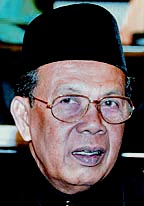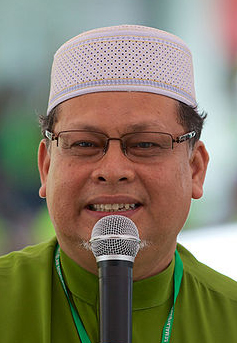
WHAT are the benefits of implementing hudud in Malaysia, even if it just begins in Kelantan?
So far, the most consistent argument for hudud — whether from PAS, Umno, Perkasa or Isma — is that Muslims cannot say “no” to hudud. Islam is a complete way of life, and hudud is part of that way of life. At the same time, non-Muslims have been told they have no business discussing the Islamic penal code, what more, opposing its enforcement.
Still, it would seem that the only way to convince detractors – whether Muslims or non-Muslims – would be to spell out the benefits of hudud so that Malaysians can decide if hudud is actually good for the country. And so that the electorate can make informed assessments about the politicians who are pushing for Malaysia to be an Islamic state.
Safety benefits
PAS has said hudud is needed to reduce crime. By that argument, Malaysia’s Penal Code is ineffectual in tackling rising crime. Presumably, the harshness and brutality of hudud punishments will serve as a major deterrent. The proof, however, is in the statistics.
States that have adopted hudud such as Sudan, Nigeria, Pakistan and Saudi Arabia show no proof that hudud prevents or reduces crime rates. What’s worse, the implementation of hudud in some of these countries actually results in injustices towards victims of crime.
In Pakistan, for example, crime rates have increased even though hudud was introduced in 1979. The state’s very own Council for Islamic Ideology says in its 2006 report that hudud laws have not reduced crime in Pakistan. Not even hudud crimes have been reduced as a result of enforcing the Islamic penal code. In fact, the council states that the “increase in the rate of crimes is despite the fact that the rate of conviction has been higher than the acquittal”.
Worse, hudud laws are used against rape survivors, who are harshly punished for adultery or fornication, while the rapists get away scot-free.

In fact, former Chief Justice Tun Abdul Hamid Mohamad has pointed out that countries with hudud such as Pakistan, Nigeria and Sudan “are still far behind” Sweden, Norway, Iceland, Denmark and Japan, which don’t have hudud.
Additionally, according to the Global Peace Index, which measures, among others, the level of safety and security in society, the top five most peaceful nations are the secular states of Iceland, Denmark, New Zealand, Austria and Switzerland.
And if that isn’t convincing enough, consider this: researchers from George Washington University developed an Economic Islamicity Index that measures economic systems’ adherence to Islamic principles such as justice, treatment of workers, and poverty eradication. It attempts to answer the question, “How Islamic are Islamic countries?”
The five highest-ranking states in the Economic Islamicity Index are New Zealand, Luxembourg, Ireland, Iceland and Finland. Saudi Arabia ranked 131 out of 208 nations that were researched.
Constitutional benefits
PAS has also stressed its “democratic right” to implement hudud in Kelantan because the electorate voted the party into power. PAS says it has been promising the implementation of hudud for the past 20 years, and they must keep their promise to the Kelantanese.
What PAS doesn’t ask is, does implementing hudud uphold or undermine the federal constitution on which the nation was founded? In order for hudud to be implemented, Malaysia would first need to be a theocracy, because hudud are crimes against God or against limits ordained by God.
But Malaysia was never set up as a theocracy. The highest law of the land is a secular federal constitution, not God’s laws based on the Muslim faith or any other faith, and definitely not based on the Quran.
PAS is not likely at this stage to be successful in its attempt to implement hudud in Kelantan because it will need a two-thirds majority vote in Parliament to amend the constitution. But the fact that PAS, with support from Umno, would even push ahead with its Islamic state ambitions tells us that its leaders want to undermine the very foundation of our nation state.
Not only that, the move demonstrates scant regard for the nation states of Sabah and Sarawak. Part of the agreement for Sabahans and Sarawakians to join the federation of Malaysia in 1963 was that there would be no state religion in either Borneo states. Additionally, provisions relating to Islam in the constitution would not apply to Sabah or Sarawak.
We can rest assured that Sabahans and Sarawakians, whose proportion of non-Muslim populations are much larger than in the peninsula, will not take kindly to an Islamic state. At a 2 May 2014 Hudud@Malaysia? public forum in Kuala Lumpur, panelist Abun Sui Anyit from Sarawak rightly asked the forum if PAS’s demands for hudud will eventually lead to the breaking up of Malaysia.

Not only is PAS undermining the constitution through its demands, it’s also insisting that the constitutional guarantee of equality before the law can be discarded. In fact, Kelantan Deputy Menteri Besar Datuk Mohd Amar Nik Abdullah has declared that it is fair for Muslims to have their hands chopped off under hudud, while non-Muslims are only sentenced to jail time under the Penal Code for the same crime.
Political benefits
PAS has reportedly told its partners in the Pakatan Rakyat (PR) that it has no choice but to push ahead with its plans for hudud because of Umno’s challenge. Additionally, the Islamist party reportedly said it was having trouble winning back Malay-Muslim support, and it would lose more votes if it didn’t forge ahead with hudud.

Does the evidence support PAS’s strategy at winning back votes? DAP parliamentary leader Lim Kit Siang provides evidence that the issue of hudud “has never been and will never be a vote winner for PAS based on past electoral evidence”. Additionally, Lim points out that if hudud had been an issue during GE13, the PR would also have suffered setbacks in several states.
What has also become apparent is that PAS’s insistence on hudud may break up the six-year-old opposition coalition. DAP leaders have already told PAS to leave the PR and a breakup of the PR today is not unimaginable. PAS should remember that the opposition coalition Barisan Alternatif broke up in 2001 because it would not back down from its Islamic state ambitions, leading to the opposition fighting multi-cornered fights in the 2004 elections.
Who benefits?
If PAS eventually gets its way with hudud, who actually benefits? Not citizens, who won’t experience a safer society and who will, in fact, face more entrenched inequalities and other injustices. Not the nation, which will be rent apart due to a constitutional crisis. Definitely not the PR or the rakyat who have backed the coalition in order to see a change in government. And, very likely, not even PAS, if past electoral results are anything to go by.
At the Hudud@Malaysia? forum, what was apparent was how disconnected PAS’s rhetoric on hudud is from the realities of Malaysian politics and modern societies. Eventually, panelist Mohamed Hanipa Maidin, who is a PAS central working committee member, softened his stand to say he personally believed hudud should not be a priority. Unfortunately, he also said, “When you belong to a political party, your personal opinion doesn’t count.”
What counts is clearly PAS’s agenda for the nation. Hanipa himself admitted that there were two views within the party. One was to proceed with hudud now because the party somehow owed it to the Kelantanese. And the other was to capture Putrajaya first, then implement hudud laws.
So, whether it’s now or later, Malaysian voters should be clear what PAS’s ambitions are. And if that’s what the party’s agenda is, how beneficial would it be to Malaysia to have PAS in power? ![]()
Jacqueline Ann Surin will not be voting for PAS, Umno or any other party that wants Malaysia to be a theocracy. She believes secular states provide the best protection against rights violations in the name of religion, and there are already enough abuses in the name of Islam in Malaysia.


neptunian says
With the spurious use of the sedition act and the abuse of non “umno” bumis by the likes of Isma, this subject or comments on it may lead a few of us to the gallows…..
Think I have said enough
Shadaan says
These are ancient laws that do not make any sense especially in this century. Women are already discriminated against in society and these laws will add more clout to discriminate against women further. When politicians introduce a religious law they want mass control over the public and these laws perfectly deliver mass control. They are unable to implement the current laws because of corruption how will they handle these [hudud] laws.
faraabdul says
PAS does not really want to implement hudud. Notice how this issue keeps popping up and then shelved back? Nothing is being done except talk.
And there are a lot of simpletons who think hudud is a magical pill that solves all crime and social problems even when there are tons of evidence which show otherwise. Worse, they don’t even know what crimes hudud covers.
Whatever benefits hudud has, it is not suitable to implement that now. There are more pressing concerns we need to address and as the ex-mufti of Perlis said, hudud will cause more injustice if implemented improperly.
GlueBall says
People should be able to choose their religion at 18, not be born into it…because many people reject living according to the fairytales of an imaginary friend in the sky.
Joe Fernandez says
Hudud is unconstitutional. Hudud is not law. Law must have source. If Hudud cites Mohd and Allah, these are not sources in law.
Having said that, no people can be judged by two separate laws for the same crime.
All are equal before the law.
No one is above the law.
In Brunei, the royal family is above Hudud.
Dragonball says
I have heard that in Saudi where there are Hudud laws, you can leave your laptop at a table to “book” it and it will be there when you get back. If you don’t pay back a loan, you can be imprisoned.
Crime rates in Malaysia as a whole is one of the highest in the world. What would you suggest the authorities should do? What advice would you give the police to be stronger? Have you considered overcrowded prisons? Have you considered the disparity in income in this country?
Sunna Sutta says
Yes, if your laptop is stolen in Saudi Arabia and someone is caught and convicted for the theft, that person loses his/her right hand for the first offence and more part limbs and eventually whole limbs for subsequent offences. However, supposing the said person is in fact innocent. Would the syariah court be able to “unamputate” the person’s limb/limbs? In civil criminal law, according to the Blackstone formulation, “It is better that ten guilty persons escape than that one innocent suffer.” On the other hand, the basis of reasoning in hudud law seems to be the reverse.
Regarding one’s inability to repay one’s loans, under civil law the debtor is allowed to declare bankruptcy. A bankrupt is not regarded as a criminal but lose certain civil rights such as the right to travel overseas on an international passport. As soon as the bankrupt is able to repay all debts, such restrictions are lifted and the person is no longer considered as a bankrupt. Bankruptcy laws protect the interests of debtors (who could merely be suffering temporary reversal of economic fortunes) from unjust punishment. The interests of creditors are also protected as there is no possibility of bankrupts fleeing the country. But it appears hudud law [..] considers the bankrupt as a criminal.
It is better to have overcrowded prisons than streets awash with blood from the stoning of (mostly) women for alleged adultery (immorality is not a crime under civil law) or people seen with missing limbs! Even if you lose your limbs through no act of crime, other people will cast suspicious looks on you. At least with overcrowded prisons, wrongly convicted people can be released from prison. Under hudud law, it is impossible to restore an innocent person’s limbs or life. As for disparity of income in this country, the rich and powerful seem to be above any system of law, including hudud. Just consider whether Prince Jefri of Brunei will ever be punished for his openly adulterous lifestyle?